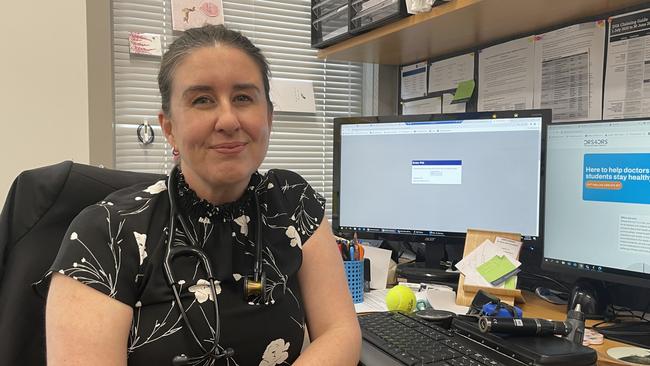GPs warn they may be forced out of ACT
Andrew Barr and GPs have been at odds over the application of a new payroll tax, with doctors warning the changes will force some practices to close their doors.

ACT Chief Minister Andrew Barr has been embroiled in a conflict with GPs for months as a result of his management of a key payroll tax dispute that health professionals say will force doctors to close their doors or leave the nation’s capital.
Opposition Liberal leader Elizabeth Lee has tried to make the rift a frontline political issue, accusing Mr Barr of launching an “outrageous” and “arrogant” attack on doctors who have criticised his government for applying a new payroll tax to GP practices.
Aiming to make health a key issue at next October’s election, Ms Lee warned that any measures which further restricted access to GPs risked clogging-up Canberra’s hospital emergency departments, which have the worst waiting times in the nation.
President of the Royal Australian College of General Practitioners Nicole Higgins told The Australian Mr Barr’s imposition of payroll tax on GPs showed “a lack of understanding about how general practice businesses operate”.
The president-elect of the AMA’s ACT branch and a Canberra-based GP, Kerrie Aust, also warned it was “absolutely possible, in the ACT, that more general practices will close or downsize and that GPs will continue to exit the profession”.
“I think you will see increased presentations to ED and we already have an incredible ED workforce who are trying to meet capacity,” she said.
Yet the claims are fiercely rejected by Mr Barr who is aiming to use the application of the new payroll tax as a vehicle to lift the ACT’s poor bulk-billing rates, which are the lowest in the country.
The political row started when the states and territories were forced to respond to a new interpretation of payroll tax which held that GPs could be viewed as employees rather than as contractors following a key decision by the NSW Court of Appeal.
Following the March 14 decision, state revenue offices issued rulings making clear that GP contractors – who historically paid a share of their earnings to a clinic instead of receiving a wage – were now considered employees for payroll tax purposes.
The RACGP sounded the alarm, saying the shake-up would expose some general practices to hundreds of thousands of dollars in additional backdated payroll tax bills. It argued that one in five general practices could close while nearly 80 per cent would be forced to increase their fees.
In April, the RACGP revealed the ACT Revenue Office had already started contacting practices across Canberra and that the new tax rules would increase costs for patients by an extra $15 per consultation. On August 26, Mr Barr responded by introducing a temporary two-year payroll tax exemption for some clinics but stressed the ACT had the highest payroll tax-free threshold in the country at $2m per year. He clarified there were fewer than 10 general practices in the ACT that exceeded this threshold.
However, to provide certainty, he said the government would waive payroll tax liabilities for medical practices until June 2023 and provide a two-year payroll tax exemption for medical practices that bulk-billed 65 per cent of their patients.
The RACGP attacked the approach, saying that Canberra was one of the most expensive places to run a practice and that, for many, bulk-billing 65 per cent of patients while staying financially viable was not possible – even factoring in the federal government’s tripling of bulk-billing incentives for pensioners, children and healthcare card holders from November 1.
Dr Aust told The Australian there were only two fully bulk-billing clinics left in Canberra and that GPs were “actively moving away from bulk-billing clinics and into mixed billing clinics”.
Speaking in the legislative assembly on August 29, Mr Barr hit back and said “lobby groups who seek to minimise tax will make all sorts of wild accusations”.
“This debate has been full of that and it has been based on a fundamental misunderstanding about how the tax is applied and how it is collected. It has also been based on, frankly, a lack of ambition in relation to bulk-billing,” he said.
Dr Higgins told The Australian the remarks from Mr Barr were “very unhelpful comments when we need to have the government and GPs at the table to find a way forward for our patients and our practices”.
Ms Lee argued that Mr Barr was no longer listening to “those people on the frontline and instead (was) forging ahead on a policy that is not going to achieve what he thinks it will”.
“In fact, what we have been told is that it will have the opposite effect and it will lead to either GPs putting up their prices or GPs closing their doors and leaving Canberra,” she told The Australian.
The most recent data published by the Department of Health and Aged Care revealed that the ACT, in the June quarter of 2022-23, had the lowest bulk-billing rate in the country at 56.1 per cent.


